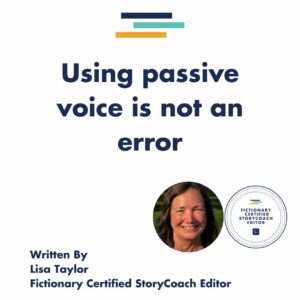
Passive voice has power.
Not the kick-you-in-the-face, don’t-look-away, hold-your-breath-and-jump kind of power, but power just the same.
But it’s considered by many to be a prose killer.
Active voice is applauded for being clear, immediate and direct. The subject is something that does the action in the sentence. According to many articles on writing, active voice is the way to hook your readers with your writing!
Active voice ensures your readers see the relationships and context of your writing.
This clarity of thought and argument is essential in academic writing. By directly connecting the author to the plot or argument, you strengthen the level of analysis.
Notice the difference between these statements:
- Passive: “Elizabeth Bennett is portrayed as…”
- Active: “Jane Austen portrays Elizabeth Bennett as…”
- Passive: “A link is made between pride and prejudice…”
- Active: “Austen draws a link between pride and prejudice…”
Through explicit connections included in the active voice, the reader clearly sees the writer’s understanding and follows the developed argument.
Before we pass final judgment and avoid passive voice forever in our fiction, let’s take a step back and see it for what it is and what it can do for a writer and a reader.

What is Passive Voice?
While in active voice, the subject does the action, in passive voice the subject receives the action:
- Active: Sam built a wall.
- Passive: A wall was built by Sam.
Here’s the grammatical structure:
Subject + some form of the verb “to be” + past participle of a transitive verb + optional prepositional phrase
Wow! Those were a lot of daunting grammar words there! Let’s make that easier by breaking down our example:
A wall was built by Sam:
A wall (subject) + was (“to be” verb) + built (past participle of to build) + by Sam (prepositional phrase)
The two examples above illustrate why readers prefer active voice.
The active voice creates a clear, concise active sentence. The passive voice is wordy and less direct.
Writing in Passive Voice
Writing guides are filled with cries to seek out and edit passive voice from your writing. Make your prose immediate. Be clear.
So why might you stray away from active voice?
When you want to draw your reader’s attention to the action or the recipient, passive voice gives you a tool.
Notice how attention shifts from Jo in the passive voice to the trip in the active voice:
- Passive: Jo was exhausted by the trip over the mountain.
- Active: The trip over the mountain exhausted Jo.
You may even be able to remove an obvious or an unknown subject and create a shorter sentence:
- Active: The government passed the bill.
- Passive: The bill was passed.
- Active: Someone stole the jewels.
- Passive: The jewels were stolen.
Using passive voice in writing is a stylistic choice, not a grammatical error. Sometimes, a passive voice can carry a clearer message for the reader:
- Passive: Don’t be overwhelmed!
- Active: Don’t let anything overwhelm you!

3 Tips for Writing in Passive Voice
Tip 1: Get your character off the hook
You may have noticed this used in real-life. Let your character use the passive voice to avoid blame. “Damaging photos were taken.” Put the unpleasantness first and avoid stating who was responsible.
Tip 2: Focus your reader’s attention
When the active subject is less important than the action or the recipient of the action, use passive voice to draw your reader’s attention. “The murder weapon has been discovered.”
Tip 3: Create narrative tone and character
Jane Austen is a master at writing in this way.
At times, she uses it to create a gentle humour, poking fun at her characters and their actions.
At other times, she uses it to add to her vivid characterisation. Notice how connection and character shine during Darcy’s declaration of love near the end of Pride and Prejudice:
“You taught me a lesson, hard indeed at first, but most advantageous. By you, I was properly humbled.”
—Jane Austen, Pride and Prejudice
The passive voice and sentence construction puts the subject and recipient together, “you” and “I”, showing the strong link. Interestingly, the action is equally strengthened by being placed at the end of the short sentence.
Notice the difference in our impression of the character:
- I was properly humbled by you.
- You properly humbled me.
- By you, I was properly humbled.
The sentence structure puts Elizabeth first, links them, and emphasises her impact on him.

When seeking the passive voice in your own writing, watch for a “to be” verb followed by a past participle. Long, complex sentences can be written using active voice. Watch for the past participle to help you identify the use of passive voice:
Over the hill, there were hordes of soldiers assembling into squads and arranging weapons at the ready.
While not a tip about passive voice in particular, avoid overuse of “to be” verbs. For example, the sentence above could be:
Over the hill, hordes of soldiers assembled into squads and arranged weapons at the ready.
Remember!
Identify passive voice in your writing. Evaluate the impact of using passive voice rather than active voice.
Decide what works best for your reader and your story.
Make the best stylistic choice for your story. Using the passive voice is not an error. Sharpen your prose with thoughtful use of this tool.
Article Written by Lisa Taylor

Stories are powerful. Through my experience as an educator and librarian, I’ve explored how stories work and supported writers in finding their voices and honing their craft.
As a Fictionary Certified StoryCoach Editor, I offer a thorough, objective structural story edit that honours your voice, recognises and celebrates your skill, and offers clear, actionable ideas on ways to make your story shine even more. You can reach me through the Fictionary Online Community.

